|
Sailing Log: 9/30/04
|
|
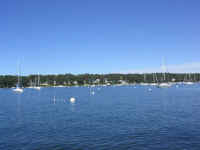 With
the end of the season only a few very short days hence (haulout on
Monday, October 4), I understood the need to go sailing whenever the
weather dictated. Today was one of those days: bright, crisp
(even cold, overnight and into the morning before the sun took hold),
and with pleasing winds. With
the end of the season only a few very short days hence (haulout on
Monday, October 4), I understood the need to go sailing whenever the
weather dictated. Today was one of those days: bright, crisp
(even cold, overnight and into the morning before the sun took hold),
and with pleasing winds.
The
anchorage was starting to take on its late season look, with many empty
moorings and lots of boats that were awaiting haulout, stripped of
sails, gear, and life. |
|
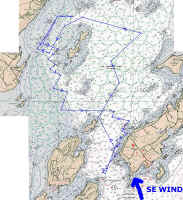
Approximate Route
Chart
(Course line is not exact, but I tried to show the various tacks, etc.)
|
|
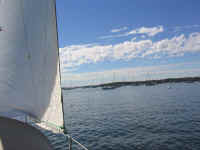 As
it turned out, the winds were pretty light to start, but there was more
than enough to sail away from the mooring. What wind there was was
true southeast, and winds like this, in the immediate area, tend to be
strongest in certain places: specifically along the southern end
of Clapboard Island, which is the most open to the sea through a narrow
pass between Cow and Diamond Islands, and where also there is frequently
a land-based thermal effect on the winds. (This is most notable
directly in the lee of the island, however). As
it turned out, the winds were pretty light to start, but there was more
than enough to sail away from the mooring. What wind there was was
true southeast, and winds like this, in the immediate area, tend to be
strongest in certain places: specifically along the southern end
of Clapboard Island, which is the most open to the sea through a narrow
pass between Cow and Diamond Islands, and where also there is frequently
a land-based thermal effect on the winds. (This is most notable
directly in the lee of the island, however).
|
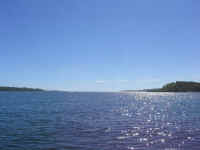 With
obvious holes visible on the water all around the narrow bands of wind,
I concentrated on tacking continually into shore as much as possible,
within the constraints of the navigable water. Frequent tacks are
sort of fun when the wind is light, but one tires quickly if the wind is
heavier (I tend to try and avoid it then). Today, it was a
joy. I had no distinct plan as to where I was headed, but
eventually it seemed clear that I was following the wind bands up to
Hussey Sound, which is oriented almost exactly towards the southeast. With
obvious holes visible on the water all around the narrow bands of wind,
I concentrated on tacking continually into shore as much as possible,
within the constraints of the navigable water. Frequent tacks are
sort of fun when the wind is light, but one tires quickly if the wind is
heavier (I tend to try and avoid it then). Today, it was a
joy. I had no distinct plan as to where I was headed, but
eventually it seemed clear that I was following the wind bands up to
Hussey Sound, which is oriented almost exactly towards the southeast. |
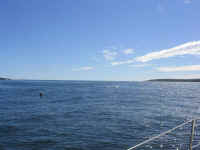 The
tide was flooding, and the Hussey features very strong currents down its
deep center. Racers in the area know that to avoid an adverse tide
in the sound, one must tack along one of the shores--preferably the Long
Island shore, which is quite out of the strong current. To get
there, however, one needs to sail straight across the sound at the point
where the current is strongest (at least from the direction I was coming
from), so in very light winds I continued sailing across the sound,
dodging lobster pots sideways as the 2-knot current swept me back into
the center of the bay. Halfway across, it was obvious that I was
not going to be able to sail outside of one particular lobster boat that
was fishing there, so I tacked directly into the face of the current, in
about the strongest point. (Ouch!) This was a killer, but I
remained on the tack only long enough to get around the lobster boat,
after which I gratefully tacked back towards Long Island. The
tide was flooding, and the Hussey features very strong currents down its
deep center. Racers in the area know that to avoid an adverse tide
in the sound, one must tack along one of the shores--preferably the Long
Island shore, which is quite out of the strong current. To get
there, however, one needs to sail straight across the sound at the point
where the current is strongest (at least from the direction I was coming
from), so in very light winds I continued sailing across the sound,
dodging lobster pots sideways as the 2-knot current swept me back into
the center of the bay. Halfway across, it was obvious that I was
not going to be able to sail outside of one particular lobster boat that
was fishing there, so I tacked directly into the face of the current, in
about the strongest point. (Ouch!) This was a killer, but I
remained on the tack only long enough to get around the lobster boat,
after which I gratefully tacked back towards Long Island. |
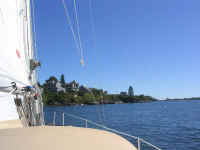 I
short-tacked along the Long Island beach, enjoying the lack of
current. Outside, I noted that there were some good sized swells
crashing on the outer island rocks, probably leftover from the remnants
of Hurricane Jeanne, which had passed offshore earlier in the
week. Long Island is home to a number of classic island Victorian
cottages, the sorts of homes that should be on an island (not
McMansions). While the houses are too tightly packed together for
my taste, I'm sure it's a pleasant community of which to be a part. I
short-tacked along the Long Island beach, enjoying the lack of
current. Outside, I noted that there were some good sized swells
crashing on the outer island rocks, probably leftover from the remnants
of Hurricane Jeanne, which had passed offshore earlier in the
week. Long Island is home to a number of classic island Victorian
cottages, the sorts of homes that should be on an island (not
McMansions). While the houses are too tightly packed together for
my taste, I'm sure it's a pleasant community of which to be a part. |
|
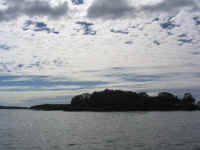 Once
clear of College Island, marking the end of my current-free sailing, I
sailed across the sound on port tack towards Pumpkin Nob on the other
side. However, the winds were light, the adverse current was
strong, and the water was relatively confused, a combination of lobster
boat wakes, current, and the underlying swell from offshore. I
abandoned any plans to continue further out, and instead tacked around
to begin a downwind run, this time with all that current in my
favor. My speed soon blossomed to around 5 knots, after struggling
upwind at 2-3 knots. Once
clear of College Island, marking the end of my current-free sailing, I
sailed across the sound on port tack towards Pumpkin Nob on the other
side. However, the winds were light, the adverse current was
strong, and the water was relatively confused, a combination of lobster
boat wakes, current, and the underlying swell from offshore. I
abandoned any plans to continue further out, and instead tacked around
to begin a downwind run, this time with all that current in my
favor. My speed soon blossomed to around 5 knots, after struggling
upwind at 2-3 knots.
I tacked downwind in a light
breeze, staying right on the verge of a band of clouds that had swept in
from the south; I had my flannel shirt on and off a half-dozen times as
the sun peeked in and out. As I rounded the northern end of
Clapboard, the wind, which had seemed to be fizzling out, suddenly strengthened
to a perfect 15 knots, so I eschewed the thought of heading to the
mooring and instead hardened up and enjoyed a great beat up the inside
of the island, back towards The Brothers and Portland. On the
south side of the island, the wind again lightened, so I turned and
sailed pleasantly back to the mooring.
I picked up the mooring
under sail, but the tide had wrapped the pendants slightly around the
chain, and I couldn't get the line immediately on board.
Annoyingly, this caused my otherwise fine mooring attempt to go wrong,
as the tension on the line snubbed the bow, and the stern swung around
(with the main still up). No harm was done, but I hate it when the
boat ends up sailing in a circle around the mooring ball. In any
event, I soon had the line untangled and properly secured, and I enjoyed
putting the sails away and cleaning up the boat, as well as taking care
of a few end-of-season chores. Depending on the weather over the
next couple days, it seemed as possible as not that today could have
been the last sail of the season. A good one it was.
One way or another, I'd be
back on board Sunday, either to sail the boat partway to the Royal River
for a late season overnight cruise before Monday's haulout, or else to
remove the sails and such to prepare for Monday.
|
|